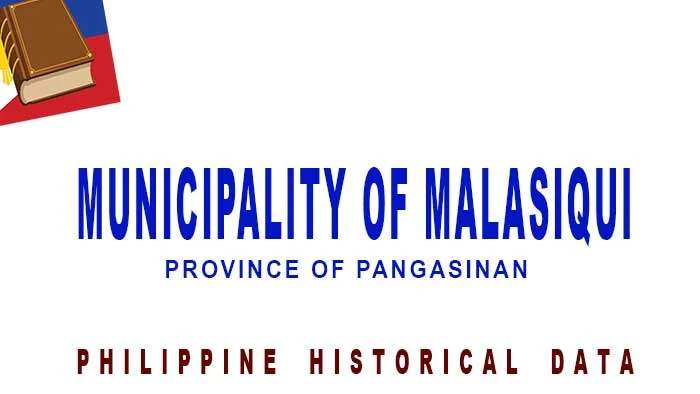MUNICIPALITY OF MALASIQUI (PANGASINAN), Historical Data of
[Note to the reader: Unfortunately, the historical data on file at the National Library of the Philippines Digital Collections for the town of Malasiqui, Pangasinan, is limited to a measly 5 pages. This is obviously incomplete, and we can all only surmise that the original "hard copy" had been destroyed before it was scanned for posterity. This particular document begins in the second part, typically the "folkways" section of these historical data; and pagination is not even supplied. Hence, the pagination we use in transcription is not at all that of the original file. Moreover, these pages are also torn in parts, which will, naturally, prevent full transcription. We were tempted not to transcribe this document at all, but decided to do so, nonetheless, to stay true to the mission of this web site.]
[p. 1]
good social standing or with good and exemplary conduct or sometimes goodlooking, too. Then, they adopt the name of the person. This same process is usually true also with the selection of the prospective godparents or the sponsors during baptism. The reason behind this very careful selection is that it is believed that the baby will have the same characteristics as his or her sponsors or of those persons from whom their names were adopted.
Then, during the baptismal ceremony, some parents will intentionally cause their babies to cry by pinching, believing that a baby who outcries the other babies during the ceremony will have a healthy and prosperous life and will eventually be a leader.
Another way of assuring the future of a child is the race towards the door just after the ceremony. The baby whose sponsor is able to reach the door ahead of the rest will mean a healthy constitution and a long life. Then, too, the baby will grow to be a leader.
The future earning capacity of the baby is believed to have a bearing based on what the sponsor gives to the baby. When nothing is given, the baby, it is said, will be hard-up during adulthood. But when the sponsor is lavish in giving, then the baby will grow to be rich.
[Note to the reader: The last paragraph of this page is torn down the middle. It makes no sense to transcribe the words that are visible.]
[p. 2]
[Note to the reader: This page continues the torn portion of the previous page, which contains superstitious beliefs of the people of Malasiqui.]
[Note to the reader: The last paragraph of this page is torn down the middle. It makes no sense to transcribe the words that are visible.]
[p. 3]
Inkalaus toy songoto, mata toy sigar.
GAMES OF OUR OLD GRANDPARENTS
1. Pungkit
2. Kit-kit
3. Sanpiruan (San Pedro)
4. Hide and Seek
5. Sungkaan
When our grandparents had their social hour, they danced the valse, native dances such as Los Bailes de Ayer, Pandango sa Ilaw, etc. Theirs was very different from our social hour nowadays. The dancers were far apart from each other, unlike today. Their music or pieces were either melancholic or fast in tempo. In going to dances, the ladies were never without chaperones.
PABITIA - (Riddles)
Saksakey so akagawat. (marikit - lady)
[Note to the reader: The last paragraph of this page is torn down the middle. It makes no sense to transcribe the words that are visible.]
[p. 4]
10. Walay baboy kon balog, nanpasak ed beneg. (langka)
11. Ikol na pusa, nakagawat na sira. (banwit)
12. Kinahon-kahon, kinaban-kaban, ag amtay pantombokan. (kawayan)
13. Inbantak koy turok, nakar toy supok. (olag)
14. Kinon-puso, kinon-puso, kahanan no Mayo. (mangga)
15. Walay niog kon pisag, sanlabik ya inigar. (bulan)
16. Insikuat koy tinibey, nakar toy amin ya bahley. (kirmat)
17. No libaran ko asingger, no laen ko araw-rawi. (niog)
20. Say onsan ag onsse-asel, say komadua mamangan, say komatlo manpapasnok.
22. Abung nen Doña Maria, aliber na espada (pina)
23. Patayen ko ta kabusol ko, angoban ko ta inarok. (piseng)
24. Goyuren ko ombatik, bulusan ko ondean. (ayor)
25. Walay niog kon pisag, sanlabik ya inigar. (bulan)
26. No labi mantablaak, no agew mantobong ak. (ikamen)
27. Kiew ya linok-linok, pagtogtoonay balitok. (kandila)
28. [unreadable, page torn]
29. Walay abung ko balag, saksakay so lusek, buyug ay inpaliber. (niog)
30. Sigbat ak lan sigbat, balet ag onbakat. (danum)
31. Amayamay kamin, sana [unreadable], gatin-gatiman daka mi. (takayan)
[p. 5]
PROVERBS
| Pangasinan | Translation |
| 1. No antoy intanem mo, sikatoy aniyen mo. | 1. As you sow, so shall ye reap. |
| 2. Say ugaw ya saroen, sikatoy papairapen. | 2. A child lavishly loved is inversely being punished. |
| 3. Anggepoy manderal ed balatyang no ag say lati tom lanlamang | 3. Nothing destroys iron but its own rust. |
| 4. No siopay asinggar dalikan, sikatoy nakaunan mangan. | 4. He who is near the stove or kitchen eats first. |
| 5. Say tuan aro, masimit anggad ngoro. | 5. True love remains sweet to the end. |
| 6. No iner so niparokulan no, dinay bangonan no. | 6. Where one falls down, there will he get up. |
| 7. Say biin nagasgasal, singa asin ya sawsawan. | 7. A shameless maiden is like a salt-cellar that soon melts away. |
| 8. No antoy kinaatagey mo, ontan me so dapuan mo. | 8. The greater the height, the greater the fall. |
| 9. Anggapoy manbanbey bangan ag nauringan. | 9. He who handles a rice pot will have grimy hands. |
| 10. Anggan antoy pait na palya, diad mangusto nasamnit ya anggapoy kapara. | A most bitter fruit is sweet to the one who likes it. |

